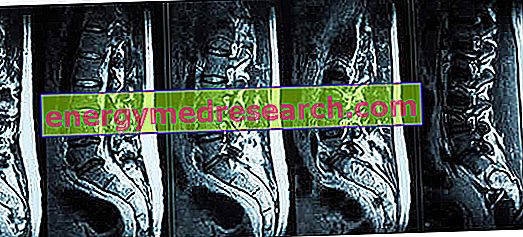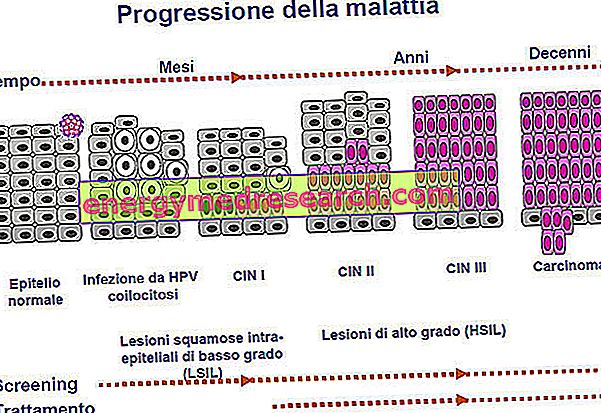Definition
Hepatitis defines inflammation of the liver, whose severity depends on the causal element responsible for the inflammatory process (viruses, drug abuse, alcohol, ingestion of Amanita phalloides, autoimmune diseases). Cirrhosis is the most feared complication of hepatitis.
Classification, causes and symptoms
There are different forms of hepatitis:
- Hepatitis A. Cause: RNA virus (HAV). Transmission: via the fecal-oral route (food and contaminated water). Main symptoms: anorexia, abdominal pain, fever, jaundice, general malaise, nausea, vomiting.
- Hepatitis B. Cause: HBV virus. Transmission: unprotected sexual intercourse, occupational exposure, mixed use of infected syringes. Symptoms: abnormal liver function, anorexia, fever, severe abdominal pain, jaundice, nausea, vomiting.
- Hepatitis C. Cause: Hepatitis C Virus (HCV) virus . Transmission: contact with infected blood (eg maternal-fetal route, transfusion of infected blood, infected syringes, etc.). Symptoms: liver changes, weakness, abdominal pain, glomerulus-nephritis, loss of appetite, nausea.
Hepatitis D, E, G are other forms of liver inflammation associated with viruses.
The other types of hepatitis can depend on the immoderate intake of drugs (NSAIDs, antibiotics, paracetamol, some steroids), alcohol, drugs (eg ephedra, cascara) or toxic substances (aggressive solvents, herbicides, industrial chemicals, etc.). ): in this case, we speak more correctly of toxic hepatitis. Autoimmune subjects represent the most risky category of hepatitis.
Diet and Nutrition
Information on Hepatitis - Hepatitis Drugs is not intended to replace the direct relationship between health professional and patient. Always consult your doctor and / or specialist before taking Hepatitis - Hepatitis Treatment Drugs.
drugs
Different and varied are the drugs used in therapy for the treatment of hepatitis; the treatment depends on the underlying cause of the problem.
Clearly, the patient suffering from toxic hepatitis should be treated first by eliminating the responsible agent: for example, when the disease depends on paracetamol abuse, the first measure to be followed is the interruption of the drug.
The prophylaxis of viral hepatitis is very important: to prevent viral inflammation of the liver, vaccination and passive immunization through the administration of gamma globulin are recommended, in addition to clearly observing simple hygienic-behavioral rules.
Let us now look in more detail at some drugs used in therapy for the various forms of hepatitis.
Toxic Hepatitis
For the treatment of drug-induced hepatitis there is no specific treatment, except the immediate suspension of the drug responsible for the damage.
In the case of acute iatrogenic hepatitis, rest is recommended and possibly the administration of intravenous fluids in case of nausea, vomiting and severe diarrhea, in order to avoid dehydration of the organism. In some cases, it is possible to administer anti-emetic and anti-diarrheal drugs.
In case of paracetamol overdose, the patient is treated with the administration of:
- ACETYLCISTEINE (eg Tirocular, Fluimucil, Mucofrin): remember that the drug performs its therapeutic action only when taken within 16-24 hours of the paracetamol overdose. Orally, take 140m g / kg (loading dose: minimum 4g, max. 15g), in a single dose. Subsequently, continue therapy by taking 70 mg / kg per os (4 hours after the loading dose), repeating the intake for 17 doses, every 4 hours. In case of vomiting within an hour of administration, repeat the previously taken dose.
Alternatively, take 150 mg / kg in 200 ml of 5% dextrose intravenously in 60 minutes (do not exceed 15 grams). Take a second dose after 4 hours from the first: 50 mg / kg in 500 ml of dextrose 5% for ev (maximum dose: 15 grams). Finally, inject into a vein 100 mg / kg of drug diluted in 1000 ml of dextrose 5%, after 16 hours (maximum dose 10 grams)
If the liver function is severely impaired, the only solution is liver transplantation.
Hepatitis A
To learn more: Hepatitis A Treatment Medicines
Hepatitis A is inflammation of the liver that generally tends to self-purge in a month or two, without leaving permanent or severe damage; affected patients often feel tired, fatigued, lacking in appetite, as well as feeling nausea. In such situations it is recommended to rest, drink plenty of fluids, take light food several times during the day and above all avoid the intake of alcohol and drugs such as NSAIDs; it is also recommended to quit smoking.
Important is the administration of standard gammaglobulin antibodies within one or two weeks after infection. In the rare event of serious complications, liver transplantation, an essential extreme life-saving remedy, may be necessary.
- Hepatitis A: vaccination. Passive immunization through the administration of standard gamma globulin is a useful prophylaxis treatment to ensure short-term immunity; Hepatitis A vaccine guarantees hepatitis A immunization of 10-20 years. Posology: the vaccine is injected intramuscularly at the deltoid area. A booster dose can be administered 1 year after the initial dose. It is recommended to take another dose after 20 years if there is a risk of exposure to the hepatitis A virus.
Hepatitis B
To learn more: Hepatitis B Treatment Medicines
In general, the acute form of hepatitis B tends to autorisolversare, therefore the patient, who is not treated with specific drugs, should respect some simple behavioral rules, such as rest, intake of many fluids (especially in the case of vomiting and diarrhea ) and light food, avoiding alcohol and hyperlipid foods.
Some patients with hepatitis B are also treated with an intravenous injection of specific immunoglobulins. For chronic forms of hepatitis B, healing times tend to be more dilated: the doctor may prescribe the administration of antiviral drugs to protect liver function and to eliminate the virus responsible for the damage.
- Peginterferon (ES. Pegasys, Pegintron) take 100 mcg of drug per week for 31 weeks; then, continue the treatment by subcutaneously taking 50 mcg / week for 35-52 weeks. The drug can also be taken in combination with Lamivudine (eg Lamivudine / Zidovudine teva Lamivudine Teva), for people with HIV and hepatitis B: in this case, it is recommended to administer 100 mcg of peginterferon subcutaneously for 31 weeks and to continue the treatment with 50 mcg a week for 32-52 weeks.
- Tenofovir (eg Viread) take 300 mg of the drug once a day. Indicated for chronic hepatitis B, the ideal duration of treatment is not known. Consult your doctor.
- Lamivudine (eg Zeffix, Combivir, Epivir): the antiviral drug is indicated for the treatment of chronic hepatitis B. It is recommended to take the drug orally once a day at the 100 mg dose.
Patients in therapy for the treatment of hepatitis B should avoid the consumption of alcohol, ibuprofen, paracetamol, aspirin and salicylates in general, in order to avoid overloading the liver.
Also in this case, liver transplantation could be the only emergency treatment, if no drug was successful.
- Hepatitis B: vaccination. The Hbvaxpro vaccine is made up of components of the hepatitis B virus and is given in three divided doses.
- Hepatitis B: passive immunoprophylaxis (eg Igantibe 1000 IU / 5ml, Niuliva 10, 000 IU / 40ml). Take an intramuscular injection of 500 units of medication for adults, 200 units for children under the age of 4, 300 for children between the ages of 5 and 9 and 200 for newborns immediately after birth.
Hepatitis C
To learn more: Hepatitis C Treatment Medicines
In some cases, hepatitis C, just like the forms described above, tends to regress spontaneously: in similar situations, the patient must adopt some simple behavioral measures, useful to speed up the recovery from illness (rest, avoid alcohol, take plenty of fluids), divide meals into numerous small snacks, avoid high-calorie and lipid-rich foods, do not take NSAIDs or antibiotics, if not essential, consult your doctor.
However, the current therapy against hepatitis C consists of the administration of pegylated alpha interferon associated with ribavirin; let's see in more detail the method of administration, remembering however that the dosage must always be perfected by the doctor, based on the severity of the symptoms and the patient's response to the treatment:
- Peginterferon alfa 2a (eg Pegasys) when used as monotherapy, take the drug at a dose of 180 mcg subcutaneously, every 7 days, for 48 weeks. When taken in combination with ribavirin, the dosage should be established by the doctor based on the patient's body weight. To hire:
- 180 mcg of drug subcutaneously once a week + 1g / day of ribavirin per os divided into two doses, for 48 weeks. For patients weighing less than 75 kilos.
- 180 mcg of the drug subcutaneously once a week + 1.2g / day of ribavirin per os, fractionated in two doses, for 48 weeks. For subjects weighing more than 75 kilos.
- 180 mcg of drug subcutaneously once a week + 800 mg / day of ribavirin per os, divided into two doses, for 48 weeks. For patients with hepatitis C and HIV.
- Peginterferon alfa 2b (eg Pegintron, Viraferonpeg) take 1 mcg per kilo per week subcutaneously for 1 year. The dosage, also in this case, must be perfected by the doctor based on the weight of the patient. The minimum dose of monotherapy is 40 mcg once a week (<45 kg), the maximum dose is 150 mcg subcutaneously once a week (weight between 137 and 160 kilos). A similar speech is valid for the combined therapy with ribavirin: once again, the dosage depends on the weight of the patient. For example, take 1.5 mcg of Peginterferon alfa 2b on kilo per week + 400 mg of ribavirin per os, divided into two doses for patients weighing less than 39 kilos. The Peginterferon alfa 2b dose may increase up to 150 mcg per week, and that of ribavirin up to 1400 mg divided into two doses during the day (weight> 105 kilos).
- Ribavirin (eg Rebetol) this drug is used in therapy with peginterferon alfa or interferon alfa 2b in patients over 18 years of age (not recommended for children and those under the age of 18). Ribavirin does not guarantee its effectiveness when used as monotherapy. For patients weighing more than 65 kg, take 400 mg orally twice a day; if a patient weighs 65-85 pounds, it is recommended to take 400 mg of the drug in the morning and 600 mg in the evening. Above 85 kilos, it is recommended to take two doses of 600 mg per day. Consult your doctor.
- Sofosbuvir (eg Sovaldi): antiviral drug recently introduced (November 2013) used in the treatment of chronic hepatitis C. From the clinical studies conducted so far, the drug has allowed the elimination of the virus up to over 90% of the cases in the most susceptible genotypes. The only drawback, the still very high cost of treatment that creates sustainability problems for public health. Sofosbuvir is taken orally; the recommended dose is one 400mg tablet once a day, to be taken with food. Sofosbuvir should be used in combination with other medicines to treat chronic hepatitis C, including ribavirin or peginterferon alfa and ribavirin.
- For hepatitis C prophylaxis, vaccination against hepatitis A and B is very useful: this reduces the risk of serious damage to the liver.



